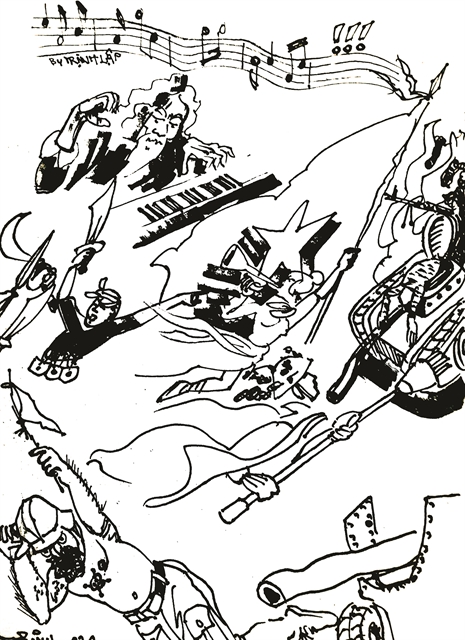 Talk Around Town
Talk Around Town


|
| Illustration by Trinh Lập |
Anh Đức
If you visit Việt Nam and ask a local to sing a random song that's not a nursery rhyme, they would likely choose Tiến Quân Ca (Marching Army Song) or Quốc Ca, the National Anthem.
The iconic song, now 80 years old, had a humble but profound beginning. According to its composer, the late musician Văn Cao, on a cold 1944 winter day, he was asked by an underground anti-French fighter, Vũ Quý, to write a marching song for the Việt Minh (The League for the Independence of Việt Nam).
Văn Cao, born Nguyễn Văn Cao in 1923, was stunned as he thought his first mission for the revolution would involve a gun, and not a music sheet. However, the artist took the job and walked back to his house at 45 Nguyễn Thượng Hiền Street, Hà Nội.
On the way back home, Cao passed by Hoàn Kiếm Lake, and saw dead famine victims, and people searching for any thing they could eat in the rubbish. Devastated, he returned to his attic and wrote the first five words of the song: "Đoàn quân Việt Nam đi" (The Army of Việt Nam marches on).
Cao also took inspiration from his own misery of wartime, after he heard the news of his mother and family starving on the way back to their hometown in Nam Định. All the anger and hatred towards the French colonialists and Japanese fascists were put into the lyrics.
After finishing the song, Cao sang it to Quý, who was impressed and the song was published in the Độc Lập (Independence) newspaper of the Việt Minh in November 1944.
Tiến Quân Ca had its lyrics edited, before being selected as the national anthem of the Democratic Republic of Việt Nam on August 13, 1945 by President Hồ Chí Minh.
The song was publicly heard on August 17, 1945 in a mass rally of the revolutionary Việt Minh sympathies in central Hà Nội. Cao, who went to the rally that day, recalled "overflowing with tears as the song was played through the speakers outside Hà Nội Opera House".
In 1946, Article 3 of the first constitution of Việt Nam said, "The national anthem is Tiến Quân Ca," confirming its identity.
And from thereon, the song has been a witness of history, following brave men and women into the war for freedom and independence; in solemn times of loss as in glorious times of victory.
Cao's masterpiece is taught to children of all generations in schools from day one, and sung by everyone at the flag-raising ceremony every Monday. But that alone is not why everyone memorises the song.
The first five notes, and the first five words of the song, evoke a feeling of national pride. The opening verse, "Đoàn quân Việt Nam đi", unites the people who sing them in a union. It gave the people the power and the belief to achieve anything.
Many songwriters have said that the opening verse of the song is a make-or-break. It comprises the attitude, the character, and the meaning that you would want to portray in a song of such importance.
Fast-forward to recent times, and the opening verse has given inspiration to many patriotic songs about Việt Nam.
In 2006, a toothpaste commercial titled "Cười Lên Việt Nam Ơi" (Smile, Việt Nam!) had a jingle that ended with a similar five-note tune as the opening verse of Tiến Quân Ca. The jingle and the commercial, however, evoked a different feeling, of both pride and a positive keep-moving-on and feel-good attitude at a time when tragedies and natural disasters befell the nation.
The commercial and the tune are still regarded as one of the most iconic and memorable ever to be shown on Vietnamese television. The tune evolved outside the commercial and was covered by renowned rapper Đen Vâu in 2020, who again reused some elements of the song in his 2023 hit, Nấu ăn cho em (Cooking for children).
However, contemporary times have also brought trouble for the national anthem. Despite the family of Văn Cao officially donating the song to the Vietnamese government in 2016, many complications involving copyright law persist, especially online.
In the match between Laos and Việt Nam in the 2020 AFF Cup on December 6, 2020, Next Media, who presented the match online on YouTube, had to mute the audio when Tiến Quân Ca was played, citing a copyright issue. The issue involved a company called BH Media, which held the right to a copyrighted audio recording of the national anthem.
The incident sparked debate among the public, who are unanimous in their thinking that the anthem belongs to the people, not a single entity or company, and that the anthem should be freely played. Just one day later, the government portal published a free-to-use recording of the National Anthem, which can be played and used by everyone.
On June 16, 2022, the Government amended the Law on Intellectual Property, in part because of the incident. The current law states: "Organisations and individuals exercising the ownership right related to the National Flag, the National Emblem and the National Anthem should not hinder the dissemination and use of the National Flag, the National Emblem and the National Anthem."
The incident also shows that as a symbol of national pride, Tiến Quân Ca is protected, praised and revered across the nation. The song endured a long journey and has become a part of many ceremonies, historical moments, and the lives of all Vietnamese people. VNS




